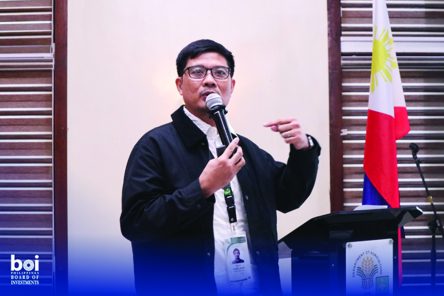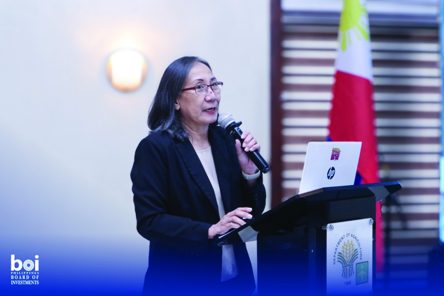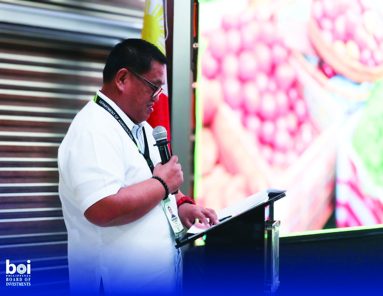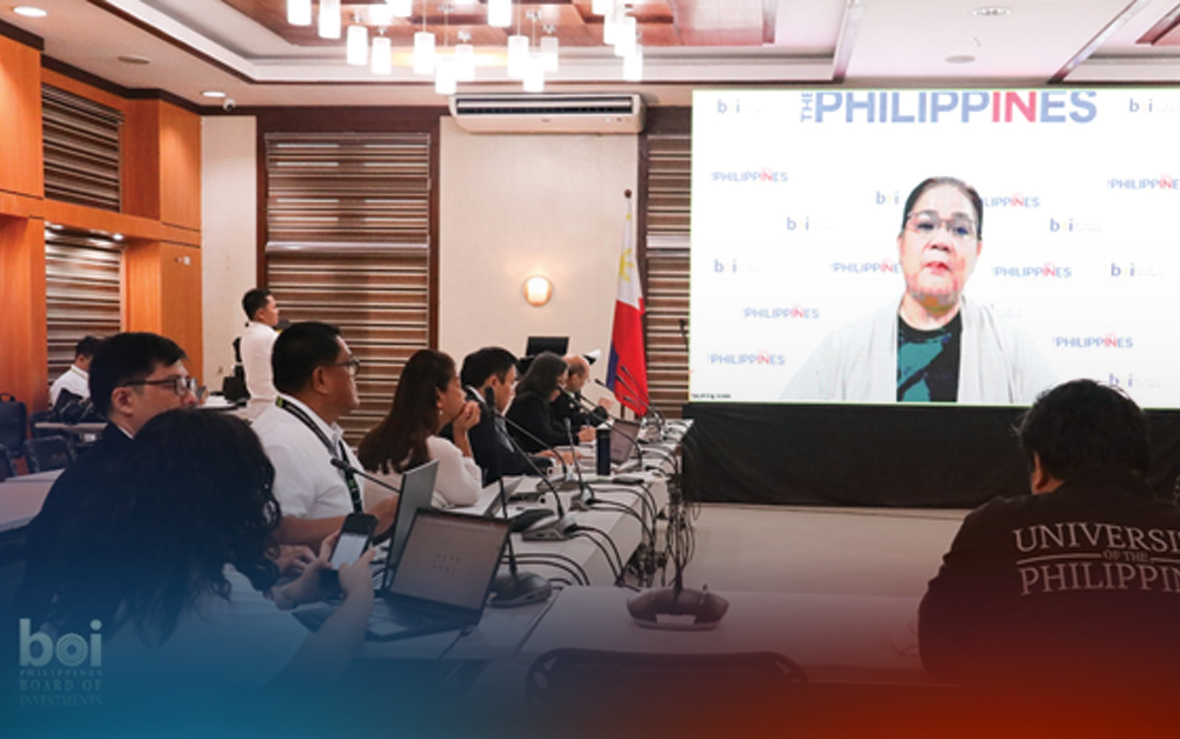THROUGH a Trade and Industry Development (TID) Talks session conducted recently, the BOI showcased the transformative potential of high-tech agriculture for the Philippines.
This hybrid event, held at the Department of Agriculture (DA) – Agricultural Training Institute) Rural Development Education Center (RDEC), gathered a panel of distinguished experts to discuss the opportunities and challenges in developing high-tech agriculture, and generated recommendations to optimize the sector’s potential in increasing productivity, driving sustainable agriculture practices and in significantly contributing to the nation’s economic growth.
 In her opening remarks, Executive Director Ma. Corazon Halili-Dichosa of the BOI’s Industry Development Services underscored the importance of aligning initiatives of various agencies to develop the country’s high-tech agriculture.
In her opening remarks, Executive Director Ma. Corazon Halili-Dichosa of the BOI’s Industry Development Services underscored the importance of aligning initiatives of various agencies to develop the country’s high-tech agriculture.
“The agribusiness sector is the backbone of the Philippine economy,” said Executive Director Dichosa, emphasizing that in 2023, the agriculture, fishery, and forestry (AFF) accounted for 9% of the country’s Gross Domestic Product, which, when expanded to include food and beverage manufacturing, comprised a significant 19% share to the country’s total output. She also echoed the woes being experienced by the sector under the Philippine Development Plan and how the transition to high-tech agriculture systems through a more aggressive industry development and investment promotions can help facilitate.
 As the national competent authority for agriculture and to establish a clear baseline of how the country fare currently in terms of high-tech agri development, Dr. Honorario C. Flameño, Director of the DA Information and Communications Technology Service provided a detailed overview of the DA’s framework for policies, programs, and key interventions to promote high-tech agri.
As the national competent authority for agriculture and to establish a clear baseline of how the country fare currently in terms of high-tech agri development, Dr. Honorario C. Flameño, Director of the DA Information and Communications Technology Service provided a detailed overview of the DA’s framework for policies, programs, and key interventions to promote high-tech agri.
His presentation highlighted the government’s commitment to advancing agricultural technologies, including precision farming, digital agriculture tools, and sustainable practices that will help boost production while minimizing environmental impact. Dr. Flameño also spoke about the DA’s efforts to integrate modern technologies in upgrading the existing agricultural value chains to increase farmers’ incomes.
Following Dr. Flameño’s insights, Ms. Maria Teresa L. De Guzman, Officer-in-Charge and Chief of the Department of Science and Technology (DOST) – Philippine Council for Agriculture, Aquatic and Natural Resources Research and Development (PCAARRD), shared the DOST’s priorities in advancing research and development for high-tech agriculture. Ms. De Guzman shared that the DOST-PCAARRD has a S&T roadmap for high-tech agriculture but needs updating.
Aligned with the DA, Ms. De Guzman emphasized the importance of fostering innovation in agriculture to help the sector meet the challenges of climate change, increasing population demands, and the need for greater food security. Ms. de Guzman also discussed ongoing and upcoming projects that aim to improve productivity and sustainability through technological advancements in agriculture.
 The session also explored how international cooperation and industry collaboration can help the country push the development of high-tech agri. Mr. Lev Nikko Macalintal, Agricultural Attaché of the Philippine Agriculture Office in Seoul discussed South Korea’s agriculturalinnovations and lessons which can be drawn by the Philippines. South Korea is one of the active partners of the DA in pushing for high-tech agri.
The session also explored how international cooperation and industry collaboration can help the country push the development of high-tech agri. Mr. Lev Nikko Macalintal, Agricultural Attaché of the Philippine Agriculture Office in Seoul discussed South Korea’s agriculturalinnovations and lessons which can be drawn by the Philippines. South Korea is one of the active partners of the DA in pushing for high-tech agri.
Adding another layer of expertise, Mr. Joseph C. Pacon presented the status of the Philippine Rural Development Project of the DA in partnership with the World Bank which has undergone several extensions already due to its success. He pointed how clear government direction and solid partnership with international development partners can effectively shape foreign-assisted projects for high-tech agriculture which needs to be pursued.
One of the features of the DA-WB PRDP Project is how it brought technology closer and more accessible to farmers and fisherfolks which demonstrates how modern technology can facilitate rural development. The event also featured presentations from representatives of CAWIL AI, Chaptu Smart Brooder Technology, and Agriserna Tech Solutions Inc. These companies shared their experiences in implementing high-tech agricultural solutions, showcasing innovative products and services that are helping transform Philippine agriculture.
Their success stories highlighted the critical role of private sector innovation in advancing agricultural technologies and the importance of responsive policies and incentives in their operations. Relatedly, the BOI through Mr. Dennis O. Panga of discussed fiscal incentives under the recently-passed CREATE MORE Act which are available for prospective high-tech agriculture investments.
The TID Talk session served as an important platform for stakeholders from the public and private sectors to collaborate, converge, discuss and forge partnerships to accelerate the development of high-tech agriculture in the Philippines. One of the key recommendations was to continue the convergence initiative from the TD Talks in order to come up with a harmonized high-tech agriculture development framework to strategically guide initiatives of concerned government agencies and the industry.

